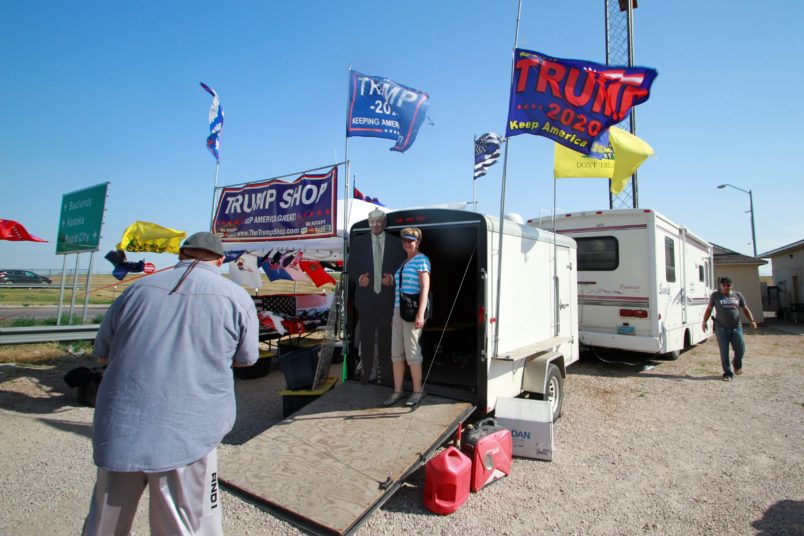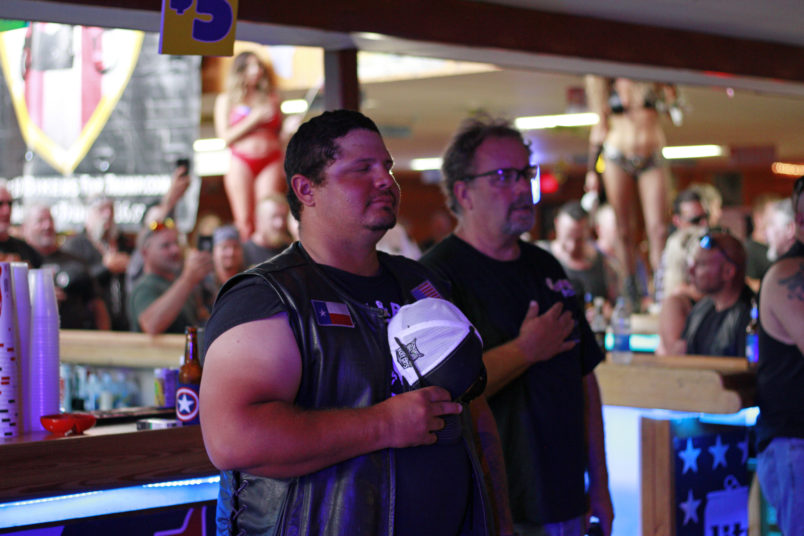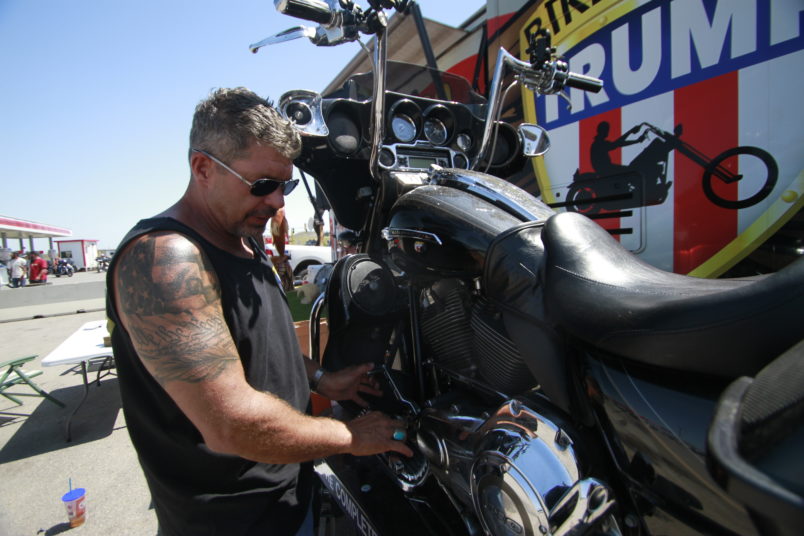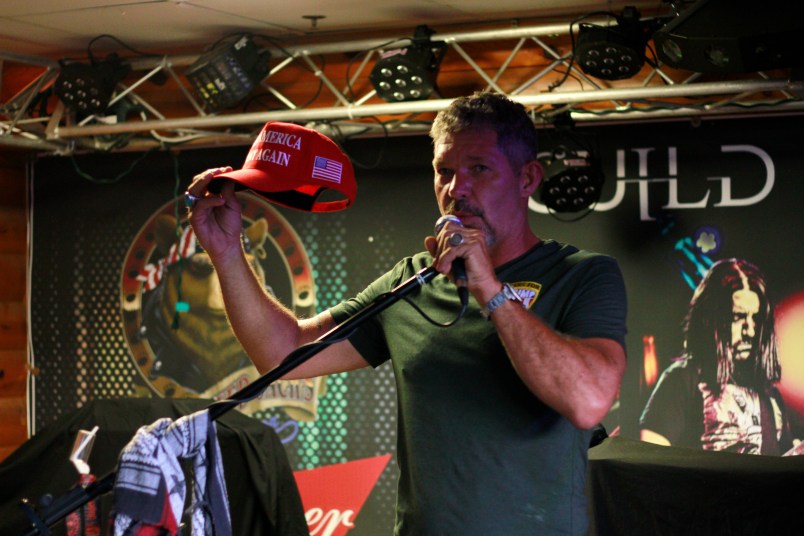STURGIS, S.D. (AP) — It’s a Friday night at a crowded biker bar in South Dakota when Chris Cox, founder of Bikers for Trump, takes the stage. While many have come to the Sturgis Motorcycle Rally for some combination of riding and partying, Cox’s focus is on something else: voting.
The coronavirus pandemic may have squashed most in-person get-out-the-vote efforts across the country, but Cox’s group remains unbothered by public health recommendations. As the Trump campaign struggles to gain momentum less than 90 days from the election, Bikers for Trump has taken advantage of recent motorcycle rallies to make direct appeals to register to vote.
While the group has gained a significant online following for its bravado in providing security at some Trump 2016 rallies, it remains to be seen if it can get bikers — many from the suburbs Trump is targeting — to show up at the ballot box.

To make his appeal, Cox enlisted scantily-clad female bartenders to join his nightly “Trump rallies” atop bars at One Eyed Jack’s Saloon. Most of the rallies consisted of reciting the Pledge of Allegiance and singing the national anthem. As members of the predominantly male audience removed their hats, one bartender who was topless except for a pair of strategically placed American flag stickers performed the Star-Spangled Banner in sign language.
“If you live in Wisconsin, North Carolina, Arizona, Ohio, Pennsylvania or Florida the campaign needs you to double-down because those are the states that we need to carry this thing,” Cox bellowed to the crowd.
Cox’s list of battleground states contained a tacit acknowledgment that many places Trump carried in 2016 are now in doubt. But his praise for the president drew cheers from the crowd, a display of Trump’s lasting favor among those who still see him as an outsider in defiance of the political elite.
“Trump tapped into all this fear and anger and frustration,” said Bill Thompson, a sociologist at Texas A&M University at Commerce who studies biker culture. “Man, he’s a master at whipping that up.”

Cox, who started the group in 2015, has shown a knack for generating political drama. He gained media attention during the 2016 election for assembling a quasi-security force at rallies and forming what he called a “wall of meat” to keep protesters from disrupting Trump’s inauguration. More recently, he has enlisted bikers to give Amish and Mennonite Trump supporters motorcycle rides to rallies in Pennsylvania.
Since the last election, Cox has tried to build Bikers for Trump into a political machine, registering a political action committee. Its Facebook group has more than 350,000 followers, and 180,000 people have signed up for a mailing list. Cox did not give numbers on how many had registered to vote.
Turning bikers into voters could prove difficult. Cox experienced that firsthand this year when his bid to represent South Carolina in Congress got less than 10% of the vote in the Republican primary.
“A lot of people want to participate, wearing T-shirts or maybe waving flags,” he said. “But the only way to really raise the bar and move the needle is to identify people who otherwise don’t vote and get them to vote.”
Chris Carr, the Trump campaign’s political director, urged members of the crowd at a rally Thursday to get their neighbors registered to vote.
“Chris Cox right here is a huge ally,” Carr said. “The president loves this man.”

With hundreds of thousands of people rumbling into Sturgis through this weekend, Cox may be in the right place to reach the suburban voters that the Trump campaign is desperate to win over. Despite the stereotype of the grizzled, tattooed biker, a significant number are what’s known as “Rolex riders,” professionals who can afford to travel across the country with expensive motorcycles. A growing number are female, college-educated and married, according to the Motorcycle Industry Council.
Cox said that women, including those from the suburbs, are willing to overlook Trump’s character to vote for his economic policies and support for law enforcement.
“It’s not always about liking the leadership, but it’s more about respecting the leadership and seeing the direction of your future,” Cox said.
Genevieve Schmitt, who founded an online biker magazine called Women Riders Now, said that she sees just as many liberals as conservatives among women riders. They often see the sport as an “expression of freedom, independence, to express herself in the outdoors,” she said.
“If you start to throw flyers at her, whatever side you are on, they kind of just turn their nose up at it,” Schmitt said. “They just want to ride.”
Cox also tried to brush aside criticism of Trump’s handling of the COVID-19 crisis. Cox called it a “plandemic, not a pandemic,” suggesting a misguided notion that the coronavirus crisis is politically motivated and will disappear.
That message may resonate with some bikers, who echoed the sentiment that the coronavirus is not as serious as health experts have warned.
“If you’re going to get it, you’re going to get it,” said Linda Harrison, who came from Ohio. “Deal with it.”
But even at the Sturgis rally, where displays opposing Hillary Clinton were common in 2016, there was an undercurrent of exasperation with the president this year.
Phillip Geary, a rallygoer from Washington, strolled the streets in a “Make America Kind Again” T-shirt. He said that he had gotten fist bumps amid the leather-clad crowd, and someone even bought him lunch.
“I think there’s more sentiment against the president,” he said. “It’s just beneath the surface, beneath the facade.”







‘k’
k
bookmarking
Especially dead ones.
Well there’s a bunch of Trump voters who won’t be alive on election day. Or if they are they will still be on ventilators in the ICU.
To judge by the size of the ones I’ve seen.
I’m beginning to wonder which social group is more ignorant: Great White fans or bikers who are likely Great White fans.